Aliyu Audu, the Senior Special Assistant to President Bola Tinubu on Public Affairs, formally announced his resignation on June 8, 2025, in a letter addressed to the President through the Chief of Staff, Femi Gbajabiamila. The resignation, which took effect immediately, was driven by Audu’s deep concerns over what he described as the All Progressives Congress (APC)-led government’s attempts to transform Nigeria into a one-party state. In his letter, Audu expressed that his decision was rooted in his commitment to democratic principles and his unwillingness to align with political maneuvers that he believes undermine Nigeria’s democratic fabric.
Audu specifically pointed to the political alliance between President Tinubu and Nyesom Wike, the Minister of the Federal Capital Territory, as a central reason for his departure. He labeled this partnership an “unholy alliance” that he believes contradicts the progressive and democratic values he has long upheld. While Audu did not provide specific details of the actions that led to his characterization of the alliance, his resignation letter emphasized that his conscience could no longer allow him to remain in a role where he felt complicit in political strategies he deemed detrimental to Nigeria’s democratic integrity.
Despite his resignation, Audu expressed continued support for President Tinubu’s economic reforms, particularly those aimed at addressing Nigeria’s fiscal challenges and promoting sustainable development. He praised the administration’s efforts to stabilize the economy, including measures to address inflation and improve infrastructure, but maintained that his political differences with the administration’s direction were irreconcilable. Audu’s decision to publicly articulate his reasons for resigning underscores a rare instance of a senior aide breaking ranks with the administration over ideological concerns.
The resignation has sparked discussions about the internal dynamics within the APC and the broader implications for Nigeria’s political landscape. Audu’s reference to a one-party state suggests a perceived consolidation of power within the APC, potentially at the expense of opposition parties and democratic pluralism. Political analysts have noted that his exit could signal underlying tensions within the ruling party, particularly as it navigates complex alliances and prepares for future electoral contests.
Audu’s tenure as Senior Special Assistant on Public Affairs was marked by efforts to communicate the administration’s policies to the public, including initiatives to promote transparency and public engagement. His departure raises questions about the future of the administration’s public affairs strategy, particularly as it faces increasing scrutiny over its political alliances and governance approach. The Office of the President has not yet issued an official response to Audu’s resignation, and it remains unclear who will succeed him in the role.
The timing of Audu’s resignation is significant, as it comes amid heightened political activity in Nigeria, with the 2027 general elections looming on the horizon. Observers suggest that his exit could embolden other dissenting voices within the APC to speak out against perceived anti-democratic tendencies. Audu’s letter did not indicate his next steps, but he emphasized his intention to remain active in advocating for democratic principles and good governance outside his former role.
In his closing remarks, Audu thanked President Tinubu for the opportunity to serve and reiterated his respect for the President’s leadership, despite their differing views on political strategy. He also called on Nigerians to remain vigilant in safeguarding the country’s democracy, urging citizens to hold leaders accountable and resist any attempts to erode democratic institutions. The resignation letter, widely circulated on social media, has generated mixed reactions, with some praising Audu’s courage and others questioning the timing and impact of his exit.




